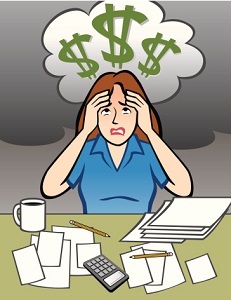 Some people are faced with taxes that they cannot pay because of a lost job or the loss of a spouse’s income. Others may have increased the number of exemptions they claimed during the recession so they could put more money into their pockets each pay period and they are now facing huge tax bills. Whatever the reason may be for owing back taxes, bankruptcy may have the solution for your tax problems. Most personal taxes are not eligible for a discharge through bankruptcy; however, there are exceptions to the general rule. Plus, filing bankruptcy can help you with your back taxes in other ways.
Some people are faced with taxes that they cannot pay because of a lost job or the loss of a spouse’s income. Others may have increased the number of exemptions they claimed during the recession so they could put more money into their pockets each pay period and they are now facing huge tax bills. Whatever the reason may be for owing back taxes, bankruptcy may have the solution for your tax problems. Most personal taxes are not eligible for a discharge through bankruptcy; however, there are exceptions to the general rule. Plus, filing bankruptcy can help you with your back taxes in other ways.
A) Wage Garnishments
If you are dealing with IRS wage garnishments for back taxes, filing a bankruptcy will stop those wage garnishments. The automatic stay provisions of the bankruptcy case stops collection activity by the IRS, including wage garnishments.
B) Spreading Out Payments on Tax Debt
Filing a Chapter 13 case allows you to pay your back taxes over a 60-month period rather than having the IRS garnish wages at a much higher rate.
C) Tax Liens
If the IRS has filed a secured tax lien, the lien can be paid through your bankruptcy case without fear of the IRS continuing efforts to collect on its lien, such as foreclose on your home or freeze other assets.
D) Interest and Penalties
Filing bankruptcy reduces the amount of money owed to the IRS in penalties and interest, allowing you to repay the back taxes through the bankruptcy at a lower amount than if you try to negotiate with the IRS outside of the protection offered by the bankruptcy stay.
E) Filing Tax Returns
If you have not filed your tax returns, you will be required to do so in order to qualify for bankruptcy protection. You must also continue to file timely tax returns each year that you are in a bankruptcy case.
F) Discharging Back Taxes
There are exceptions to the general rule that personal taxes cannot be discharged through bankruptcy. Only an experienced bankruptcy attorney should attempt to make that determination, as the rules can become quite complex depending on the individual case. The minimum requirements below must be met before undertaking a detailed analysis to determine if bankruptcy will discharge back taxes:
- The tax return that generated the taxes owed must have been due at least three years prior to the filing of the bankruptcy;
- Said tax return was filed at least two years prior to the filing of the bankruptcy;
- The IRS assessed the taxes owed at least 240 days prior to filing the bankruptcy case;
- The debtor did not commit any fraud regarding the tax return or taxes owed or willfully attempted to evade paying the taxes; and
- The taxes owed are personal income taxes only.
The issues associated with bankruptcy and back taxes can be complex; however, an experienced bankruptcy attorney can cut through those complexities to help debtors solve their tax problems. Even though the back taxes may not be dischargeable through a personal bankruptcy case, in most instances, the bankruptcy attorney can help the debtor find solutions to their tax problems through bankruptcy.
Request a free bankruptcy consultation to get answers to all of your questions about bankruptcy and back taxes. We understand how difficult it is to deal with IRS agents and how it causes sleepless nights and stressful days. We can help you solve your tax problems so that you can finally get the IRS off your back and out of your wallet. We will help you find a solution to your tax problem, as well as your other debt problems, so that you can get a fresh start and begin to recover your financial health.



